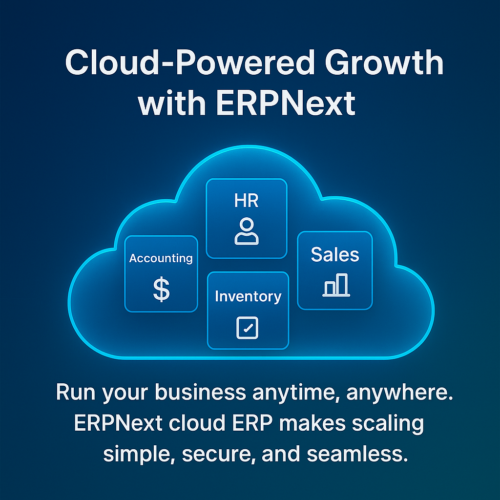Cloud-Powered Growth with ERPNext: The Future of Scalable Business Management
The way businesses operate is changing rapidly. Global competition, remote work, and customer expectations have pushed companies to rethink how they manage resources, people, and operations. Traditional ERP systems, once the backbone of enterprise management, now fall short due to their limited scalability, high maintenance costs, and lack of mobility.
This is why businesses across industries are embracing cloud ERP solutions. Among the leaders in this digital transformation is ERPNext cloud ERP—a modern, open-source, and flexible solution designed to adapt to businesses of all sizes and industries.
With ERPNext on the cloud, companies gain the ability to run operations anytime, anywhere, without being tied down by heavy IT infrastructure. Let’s explore how ERPNext cloud ERP is driving growth, scalability, and innovation.
What is ERPNext Cloud ERP?
ERPNext is a comprehensive, open-source enterprise resource planning (ERP) software that integrates core business processes into a single platform. Hosted on the cloud, ERPNext provides real-time access, secure data management, and unmatched scalability.
Instead of investing in servers, IT teams, and complex hardware, businesses can leverage cloud hosting for ERPNext, making the solution cost-efficient, flexible, and future-ready. Whether you’re a small startup or an enterprise with global operations, ERPNext cloud ERP ensures your systems grow alongside your business.
Why Businesses Are Moving to Cloud ERP
Modern enterprises demand agility. Cloud ERP offers exactly that. Here are some compelling reasons why businesses are making the switch to ERPNext cloud ERP:
- Remote Access & Collaboration → Teams can work from anywhere with secure access to real-time data.
- Reduced IT Costs → Eliminate the need for expensive infrastructure and ongoing maintenance.
- Seamless Scalability → Add users, expand modules, or upgrade without disruption.
- Business Continuity → With backups and disaster recovery, data remains safe and accessible.
- Faster Innovation → Cloud ERP ensures automatic updates and continuous feature enhancements.
Key Benefits of ERPNext Cloud ERP
1. Anytime, Anywhere Accessibility
Cloud ERP allows employees to access dashboards, reports, and modules from desktops, tablets, or smartphones, ensuring smooth operations across locations. For businesses with multiple branches or remote teams, this accessibility is a game-changer.
2. Seamless Scalability
ERPNext grows with your business. Whether you expand to new locations, add more employees, or integrate additional modules, the system scales effortlessly—without requiring costly hardware upgrades.
3. Data Security & Compliance
Security is a major concern when shifting to the cloud. ERPNext cloud ERP provides role-based access controls, encryption, and regular backups to keep sensitive business data protected. It also helps businesses stay compliant with industry regulations.
4. Lower Total Cost of Ownership (TCO)
Unlike on-premise ERP, which requires expensive servers and IT support, ERPNext cloud ERP operates on a subscription-based model, cutting down upfront investment and long-term maintenance costs.
5. Automatic Updates
Cloud deployment ensures you always run the latest version of ERPNext, with updates happening in the background. Businesses benefit from new features, bug fixes, and enhanced security—without downtime.
ERPNext Cloud ERP Modules at a Glance
ERPNext provides a comprehensive suite of modules that integrate seamlessly to give businesses a 360° view of operations:
- Accounting & Finance → Real-time financial statements, automated billing, tax management, and compliance.
- Human Resources (HR) → Payroll, recruitment, employee records, and performance management.
- Sales & CRM → Manage leads, opportunities, quotations, and customer relationships in one place.
- Inventory & Warehouse → Track stock levels, manage warehouses, automate reordering, and prevent shortages.
- Projects & Tasks → Plan, assign, and monitor projects with Gantt charts, Kanban boards, and progress reports.
- Manufacturing → Production planning, work orders, and material resource planning (MRP).
- Healthcare → Patient records, appointments, billing, and hospital management.
- Logistics & Supply Chain → Fleet management, delivery tracking, and vendor management.
- Construction & Contracts → Project costing, material tracking, and subcontractor management.
Industry-Specific Applications of ERPNext Cloud ERP
ERPNext is highly adaptable and provides tailored solutions for different industries:
Manufacturing
Manufacturers face challenges like demand forecasting, raw material management, and production delays. ERPNext helps by:
- Managing bill of materials (BOM) and production schedules.
- Optimizing supply chain operations.
- Providing real-time visibility into production costs and inventory.
Example: A factory can track raw material consumption, manage production cycles, and generate automated reports on profitability—all from the cloud.
Retail
Retail businesses need agility to manage inventory, sales, and customer expectations. ERPNext cloud ERP offers:
- POS integration with real-time stock updates.
- Centralized multi-store management.
- Insights into sales trends, customer behavior, and inventory turnover.
Example: A retail chain can synchronize stock levels across outlets while tracking customer purchase patterns for better decision-making.
Healthcare
Hospitals, clinics, and diagnostic centers require efficient patient and staff management. ERPNext delivers:
- Centralized patient data management.
- Automated billing and appointment scheduling.
- Integration with laboratory and pharmacy modules.
Example: A clinic can manage patient histories, schedule doctors, and automate billing—all securely on the cloud.
Logistics
Logistics businesses must ensure timely deliveries, route optimization, and cost control. ERPNext cloud ERP provides:
- Fleet and vehicle management.
- Real-time shipment tracking.
- Vendor and contract management.
Example: A logistics firm can monitor deliveries, optimize routes, and ensure transparent communication with clients.
Construction
Construction companies deal with large-scale projects, contracts, and material planning. ERPNext simplifies by:
- Tracking material usage and procurement.
- Monitoring project progress and labor costs.
- Generating detailed project profitability reports.
Example: A construction company can manage multiple projects across sites with unified reporting on expenses and resources.
Why Choose ERPNext Cloud ERP Over Traditional ERP?
Unlike legacy ERP systems, ERPNext is:
✔ Open-source & flexible → Customize modules to fit unique business needs.
✔ Affordable → Ideal for SMEs and enterprises looking for cost-efficient solutions.
✔ User-friendly → Simple interface and intuitive dashboards.
✔ Community-driven → Constantly updated by a global community of developers and contributors.
This makes ERPNext not just a software investment, but a long-term growth enabler.
Final Thoughts
In a world where agility and scalability define success, businesses can no longer rely on outdated systems. ERPNext cloud ERP is more than just software—it’s a strategic tool that transforms operations, improves decision-making, and ensures sustainable growth.
From manufacturing and retail to healthcare, logistics, and construction, ERPNext adapts to every industry, making it one of the most versatile ERP platforms available today. If you’re seeking cloud-powered growth, operational efficiency, and scalability, ERPNext cloud ERP is the solution your business needs.


